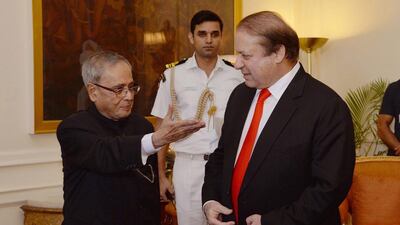In what was considered a significant indication of Narendra Modi’s policy towards Pakistan, a round of high-level talks that had been due to take place in Islamabad this week was unexpectedly cancelled at short notice by the Indian government. The stated reason for the cancellation was that Pakistan’s high commissioner to India had met Indian Kashmiri separatist leaders twice earlier this month.
For anyone even remotely familiar with the way diplomats work in both countries, it is inconceivable that such a meeting could take place without the host country’s approval. This makes me believe there must have been some other compelling reason for cancelling the talks.
Mr Modi was elected on a declared hardline policy towards Pakistan, so it would be easy to believe this decision is a manifestation of anti-Pakistan policies, but this is too simplistic a view.
In the short time since he was elected, Mr Modi has demonstrated considerable skill in handling national and international affairs. I doubt this was a rash decision.
There is more. While a serious domestic political crisis is challenging the writ of the government in Islamabad, incidents along the Line of Control (LOC) dividing Kashmir have increased. Is there a connection?
In any situation involving India and Pakistan, it is very difficult to decide who started the action. However, given Pakistan’s current situation, it would be a very foolish and very intrepid Pakistani soldier who would initiate hostilities with Indian forces. The present Pakistan army chief is beginning to establish a reputation for being intrepid but is also very far from foolish. The Indian chief, meanwhile, has been unnecessarily aggressive in his stance towards his neighbour. I think it would be safe to express the view that, in this instance, Indian aggression is far more likely than any instigated by Pakistan.
So what was the real reason for the cancellation?
Rashtriya Swyamsevak Sang (RSS), an extremist and influential right-wing Hindu nationalist faction, has not been very happy with the Indian government’s decision to initiate talks with Pakistan. Following the meeting between the separatist leaders from Indian Kashmir with Pakistan’s high commissioner, RSS leaders demanded the talks between Pakistan and India be cancelled.
Sherry Rahman, Pakistan’s former ambassador to the US, has bemoaned the signal this sends out to Kashmiris, to Pakistan and to the region. While she is absolutely right, there might be more to it than meets the eye. Mr Modi is too astute and wily to make haste unnecessarily.
I have found former Indian diplomat, M K Bhadhrakumar, to be an excellent analyst on such matters. His assessment is that Mr Modi did not really have a “road map” for his diplomatic approach towards Pakistan and made his excuses to avoid embarrassment.However, Mr Bhadhrakumar also states a secondary reason, which puts everything in perspective.
An article was inserted into the Indian constitution in 1950, granting extraordinary status to Jammu and Kashmir. In brief, this state even had its own prime minister and supreme court. But, from the very outset, this article has been opposed by the RSS and by the BJP leadership.
Later this year, the BJP is likely to be the leading contender to form the government in Indian Kashmir. If the BJP does end up heading the government, it will be in a position to ignore the constitutional amendment.
In this scenario everything falls neatly into place: the sudden cancellation of talks, the messages to Pakistan and Indian Kashmiri separatists, the aggression of the Indian army chief and the hostilities on the LOC.
All this at a time when the elected government in Pakistan is weak. In this context, everything becomes part of a masterful strategic pre-emptive manoeuvre, which is taking advantage of the domestic unrest in Pakistan to ensure minimal reaction to a possible forthcoming Indian decision.
Brig Shaukat Qadir is a retired Pakistani infantry officer

